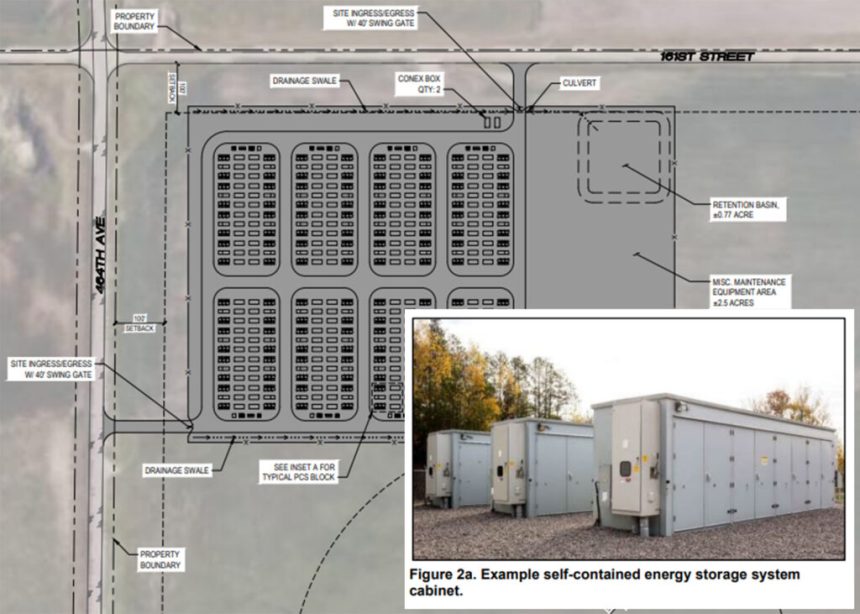An example of the battery cabinets Crowned Ridge Energy Storage I, LLC, plans to install is superimposed atop a map of the energy storage project proposed in northeastern South Dakota. (South Dakota Searchlight/Courtesy SD Public Utilities Commission)
Last month, utilities regulators voted 2-1 to tell a company that wants to put industrial scale batteries near Watertown that they’ll need a permit before they build.
Last week, lawyers for the company behind the $174 million project signaled plans to do just that.
Crowned Ridge Energy Storage I, LLC, is an affiliate of Florida-based NextEra Energy Resources. The company unsuccessfully lobbied the South Dakota Public Utilities Commission for a permitting exemption in August, arguing the project does not meet the legal definition of a facility.
If built, the project would be the first large-scale, standalone battery storage facility of its kind in the state of South Dakota. Documents filed by the company with regulators say it would utilize lithium ion or similar battery storage technology.
The company’s lawyers filed a notice of intent to apply for a permit last week, following the ruling against its petition for an exemption. The filing outlines a plan to construct, own, and operate a battery system with a 120-watt capacity in Codington County, about 20 miles northeast of Watertown. The project could store and continuously deliver enough electricity to power tens of thousands of homes for four hours before needing to recharge, the document says.
The batteries would cover roughly 15.4 acres and connect to a nearby Crowned Ridge-owned substation. It would store excess electricity from regional wind generation and release it when demand peaks. When less electricity is being used at night, the batteries can charge, and in the morning, when families flick on the lights, that stored electricity can be used.
Most impacted land is agricultural, and would be leased or bought, the filing says. Construction is expected to employ about 180 workers and result in one or two permanent jobs.
The company anticipates a final permit decision by April 2027. If approved, construction could begin in May, targeting commercial operation in early 2028.
The state’s three elected utilities regulators entered uncharted territory when the project appeared on thier docket last month.
Commissioner Chris Nelson argued in September that “batteries don’t generate electricity” and therefore fall outside the agency’s jurisdiction.
Commissioners Kristie Fiegen and Gary Hanson disagreed, saying large-scale storage puts usable electricity into the grid when discharging and should face public review.
Now, Crowned Ridge must secure both a state facility permit. It will also need conditional use and building permits and a road-use agreement from Codington County.
SUBSCRIBE: GET THE MORNING HEADLINES DELIVERED TO YOUR INBOX









